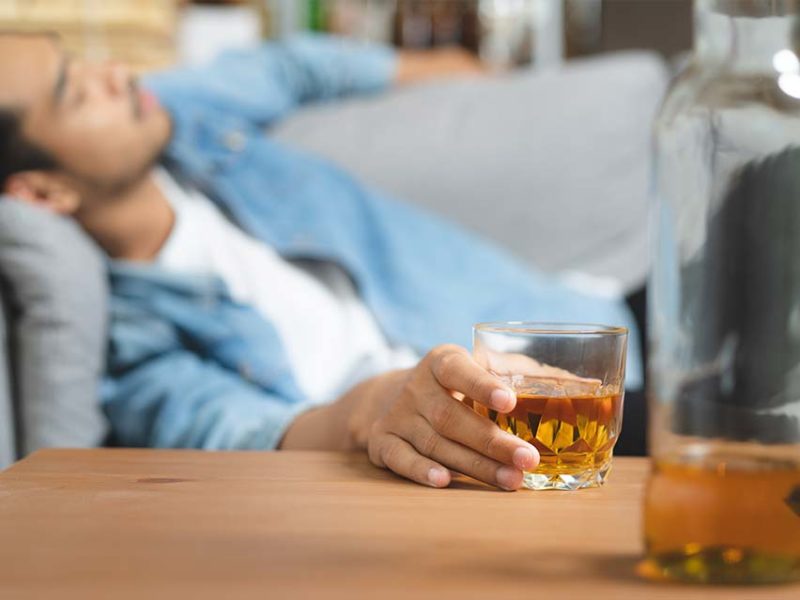Alcohol and insomnia often go hand in hand. In fact, between 30 and 75 percent of people who regularly consume alcohol struggle with insomnia. Although alcohol is a depressant that can put you in a relaxed, drowsy state, this doesn’t mean that it’s good for your sleep quality.
Struggling to fall asleep and regularly contending with sleep disruptions can be frustrating. However, when sleep difficulties are ongoing, insomnia can create mood balance issues, decreased focus, and lower overall life quality. It can also increase the likelihood of many serious health issues including diabetes, heart disease, depression, and obesity.
Not only can regular alcohol consumption cause insomnia, but insomnia itself can be a driver for alcohol abuse. Many people who live with insomnia increasingly self-medicate with alcohol in an attempt to lull themselves to sleep. This creates a dangerous cycle of low-quality sleep and increased alcohol consumption. It also sets the stage for alcohol use disorder.
Understanding Insomnia
Insomnia is consistently ranked as the most common sleep disorder. It is characterized by the ongoing difficulty in falling asleep, staying asleep for a sufficient period of time, and enjoying an adequate sleep quality overall. With insomnia, it is uncommon for people to enter into the deep, rapid eye movement (REM sleep) stage that’s ultimately essential for feeling rejuvenated and refreshed in the morning.
People with insomnia experience these challenges even though they have the desire to sleep, the opportunity to do so, and the right sleeping environments. They routinely contend with excessive daytime sleepiness and may use caffeine or other stimulants to keep themselves awake. To offset the effects of their stimulant use and to combat their insomnia, they again use alcohol at night to promote feelings of relaxation and drowsiness.
Short bouts of alcohol-induced sleep do not leave people feeling well-rested. More importantly, excessive alcohol consumption often further diminishes their sense of well-being during the daytime. Those self-treating insomnia with alcohol commonly deal with nausea, headaches, mood balance issues, and fatigue that can be attributed to both their sleeplessness and their alcohol use. The side effects of heavy alcohol consumption can also create the need to use other substances in addition to caffeine or others stimulants to promote feelings of balance and wellness.
Causes of Insomnia
There are actually many possible causes of insomnia. Certain hormonal changes can affect a person’s sleep habits and sleep quality. For instance, many women have trouble sleeping throughout various stages of pregnancy and during both perimenopause and menopause. Men frequently struggle with sleep quality issues during andropause or when their own natural testosterone production declines. Insomnia can be the result of excess psychological stress, poor sleep hygiene, and overeating in the evening. Other causes of insomnia include:
- The side effects of certain medications
- Certain medical conditions
- Excess caffeine consumption
- Nicotine use
and sleep disorders such as untreated sleep apnea.
Binge drinking is especially detrimental to a person’s sleep quality. Men, women, and adolescents who drink large amounts of alcohol within very short periods of time often have insomnia. People who drink heavily are usually reliant upon alcohol to initiate sleep. Thus, insomnia is an incredibly common diagnosis among people living with alcohol use disorder.
Alcohol’s Effect on Sleep
Alcohol use can impact each person differently. The way they are affected depends upon the health of their filter organs, their age, gender, and body weight, other substances they’re using, and their history of both sleep disorders and alcohol use among other factors. When you drink before bed, it enters your bloodstream via your small intestines and stomach. It’s then gradually metabolized by your liver as it circulates throughout your body. This process alone can delay the onset of sleep.
However, as alcohol is metabolized by your liver and as your blood alcohol content gradually declines, the likelihood of waking up increases. People who drink before going to bed are therefore more likely to have a lower sleep quality than those who do not, and more likely to experience one or more sleep disruptions throughout the night.
Facts About Alcohol and Insomnia
People who live with both insomnia and alcohol use disorder may have a hard time determining which issue is responsible for causing the other. Alcohol is neither effective nor safe as a sleep aid. When used in an ongoing fashion to induce sleep, drinking alcohol will:
- Diminish your sleep quality
- Cause frequent sleep disturbances
- Create the need to consume more alcohol to experience the same effects
- Make you more likely to develop alcohol addiction
It’s additionally important to note that the risks of using alcohol as a sleep aid increase as the health of your filter organs declines. As your liver and kidneys become less effective at breaking alcohol down, daytime sleepiness, depression, lack of focus, and general fatigue will increase. You’ll also have a significantly higher likelihood of experiencing some of the more serious effects of both insomnia and heavy alcohol use, including liver and heart disease, and diabetes.
The Bottom Line
The percentage of regular and heavy alcohol users who suffer from insomnia is incredibly high. If you’ve been using alcohol to induce sleep but are having a hard time staying asleep or getting sufficient sleep for feeling refreshed, it’s important to seek medical treatment. Insomnia is a chronic sleep disorder that can have complex underlying causes. Having insomnia properly diagnosed and treated is infinitely safer than treating it on your own with alcohol.
Due to increased tolerance and ongoing changes within your brain’s chemistry, prolonged use of alcohol as a sleep aid puts you at a high risk of having or developing an alcohol use disorder. If you recognize the signs of alcohol addiction in yourself or someone you love, we can help. Professional treatment for alcohol addiction will simultaneously address underlying conditions such as insomnia in a healthy, effective, and sustainable way. Get in touch with us now to speak with one of our admissions counselors.


